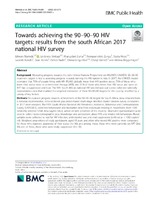Towards achieving the 90–90–90 HIV targets: Results from the south African 2017 national HIV survey

View/
Date
2020Author
Igumbor, Ehimario
Marinda, Edmore T.
Simbayi, Leickness Chisamu
Metadata
Show full item recordAbstract
Background: Measuring progress towards the Joint United Nations Programme on HIV/AIDS (UNAIDS) 90–90–90 treatment targets is key to assessing progress towards turning the HIV epidemic tide. In 2017, the UNAIDS model estimated that 75% of people living with HIV (PLHIV) globally knew their HIV positive status, 79% of those who knew their status were on antiretroviral therapy (ART), and 81% of those who knew their HIV status and were on ART had a suppressed viral load. The fifth South African national HIV sero-behavioural survey collected nationally representative data that enabled the empirical estimation of these 90–90–90 targets for the country stratified by a variety of key factors. Methods: To evaluate progress towards achievement of the 90–90–90 targets for South Africa, data obtained from a national, representative, cross-sectional population-based multi-stage stratified cluster random survey conducted in 2017 were analysed. The Fifth South African National HIV Prevalence, Incidence, Behaviour and Communication Survey (SABSSM V), collected behavioural and biomarker data from individuals residing in households from 1000 randomly selected Small Area Layers (SALs), across all nine provinces of the country. Structured questionnaires were used to collect socio-demographic data, knowledge and perceptions about HIV, and related risk behaviours.
